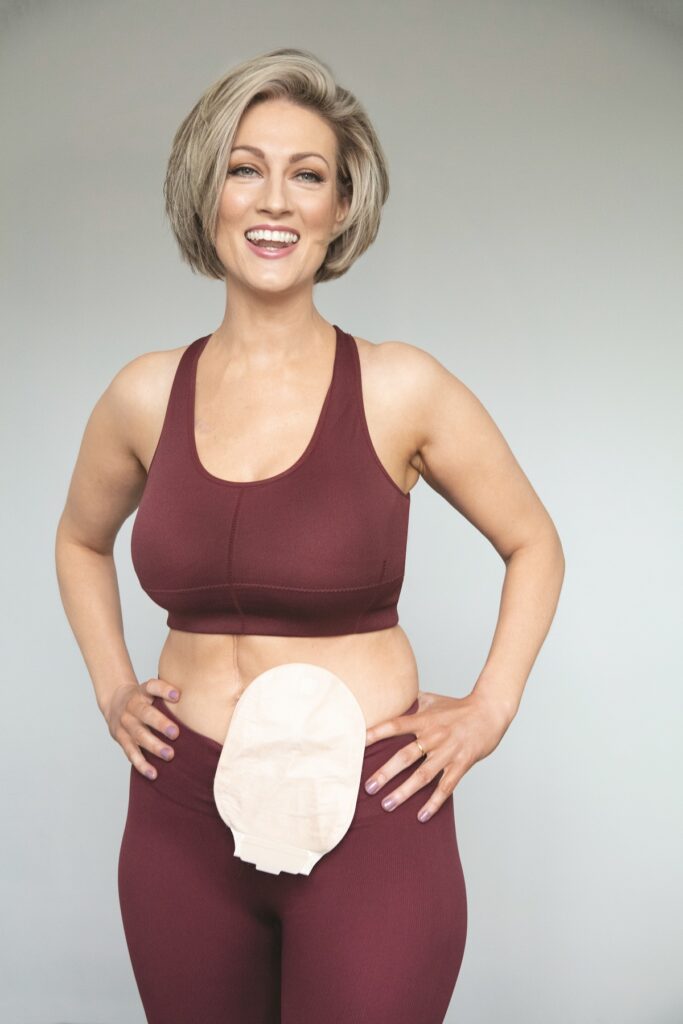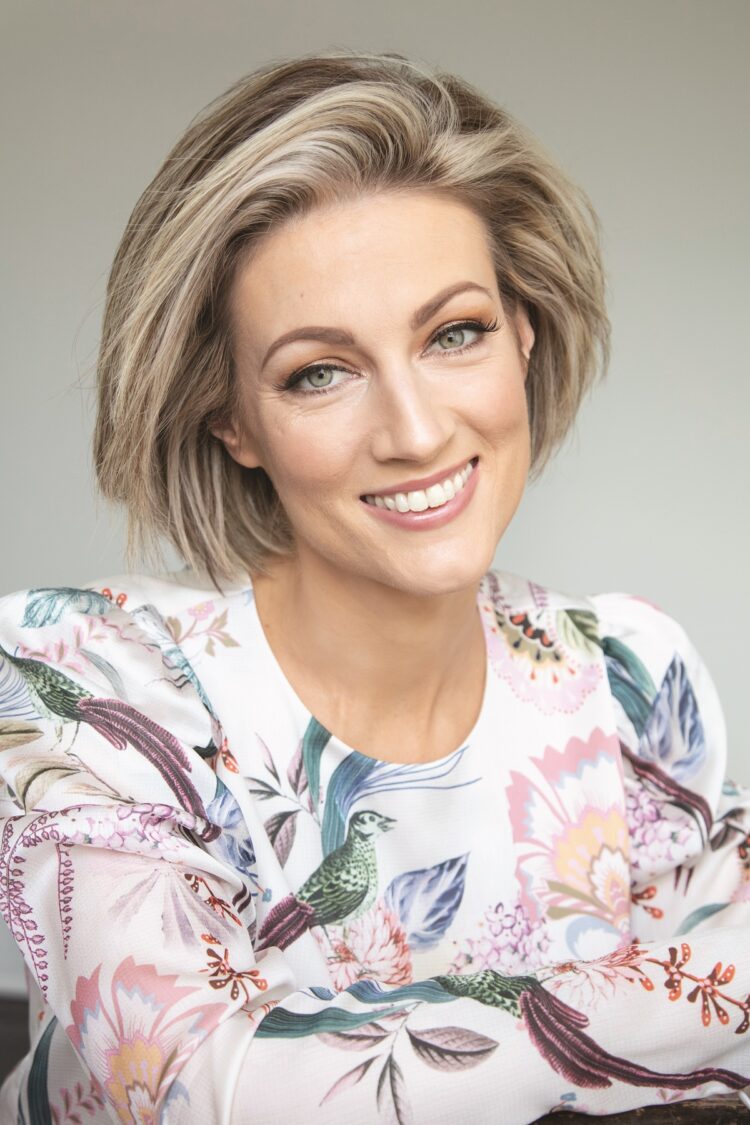This interview with Heather Skinner took place in January 2022 and appeared in the March/April 2022 issue of Irish Country Magazine. Sadly, Heather lost her fight with cancer in October 2022. In sharing this, her legacy to spread awareness of bowel cancer and inspire hope in others, continues.
A shocking bowel cancer diagnosis was not easy to accept, but Heather Skinner is determined to hold on to hope, and help others along the way. Interviewed by Róisín Healy, with photography by Lorna Fitzsimons.
You’ve undoubtedly read many stories about people being diagnosed with cancer. But Heather Skinner wants hers to be different. When she heard the words no one ever wants to hear just over a year ago, she was of course devastated, but since then she has learned so much about the power of words and positivity.
“I am going to change the conversation around cancer. I am determined to. When I was diagnosed, I was so scared of the unknown, I didn’t know if I could face what was ahead,” Heather says.
“I wish before I started chemo that I had seen someone like me. All we see is that stereotypical person on TV feeling sick and looking unwell. It’s not always like that.”
Heather’s route to diagnosis was complicated. While there were perhaps opportunities where some further investigation could have revealed what was going on sooner, this was in the height of the pandemic.
In July 2020 Heather was in A&E for something else, and mentioned she had a pain in her tummy. Doctors were quick to get a seemingly healthy patient out of A&E quickly.
“My bloods were completely clear. At that point I had no signs of elevated white blood cells, no anaemia. That’s something I want to make people aware of. Cancer is not detected that way,” Heather says.
“Side effects like anaemia can be picked up in a routine blood check, but it is only when you get a diagnosis that they can check for certain biomarkers in your blood, there are too many different biomarkers for different things. People think they’re fine if they get their bloods taken regularly, but they can’t check for everything. When that day comes we’ll all be better off.”
And so the hospital doctors and later her own GP put the pain she was feeling down to her IBS, or perhaps a gym injury, and she stopped worrying.
Before Christmas 2020, Heather was studying at Trinity to qualify as a biology teacher, and she was feeling tired but wasn’t too worried. She was working in a school and giving a grind to a biology student about the lymphatic system, and pointing to her own neck, she inadvertently discovered a lump by her clavicle.
She went to her GP, and requested an MRI. By January 9 2021, she had had enough, and asked to be referred to a private hospital.
“I was still very able, but I was in pain and had become severely anaemic at that stage. But right up to that point I was exercising as much as possible, I have a background in nutrition so I was eating very well, and I am a trained yoga and fitness instructor, so I knew my body so well,” Heather says.
“The thing is, I never saw blood in my stool. I would have reported it straight away if I did. But what no one talks about is that what they’re looking for is actually blood that is invisible to the naked eye. That’s when it’s a problem. My tumour is so far up my colon that the faecal matter mixes with it so it just looks normal, I was never going to see it. That’s why, unfortunately, this cancer is called the silent killer.”

She had a CT scan and a few hours later, an A&E doctor broke the news that she had malignant tumours in her bowel, liver, lungs and lymphatic system. Her oncologist later said her cancer must have grown quickly and aggressively.
“I couldn’t believe he was telling me I had malignant cancer. It’s not like the movies, you don’t cry, you just go into complete shock. I was in the gym a week before this happened,” Heather says.
“I was admitted then, and I was suddenly a patient on a cancer ward in the Beacon Hospital Dublin. Three days later I had open bowel surgery by the most wonderful surgeon Dr Kalbassi. To be fair, the system is very efficient once you have a diagnosis.
“I had a nurse with me all the time, she was a palliative care nurse, but she called herself the symptom control nurse, which is nicer. She told me to tell my family to bring in photographs, the yoga mat, anything and everything. This was my home now, because I was going to be there for a long time.”
During a six-hour surgery, Heather’s caecum was removed. Now her large colon is dormant, and she has an ileostomy bag, which is
attached to her ileum at the end of her small bowel.
“That is where all the digestion happens, so that is why I am alive. So now I have this bag; it is obviously a shock at the start, and people might scare you with worrying stories. But it is quite discreet, I can wear whatever clothes I want to and I exercise and swim all the time, and I’ve never had any reactions,” Heather says.
“My diagnosis was I had six months to live, if I didn’t start on chemo. It is terminal cancer, so I’m considered palliative. They really threw all the heavy, scary words at me.”
On the rise
Unfortunately, there will be many young women and men who find themselves in the same situation as Heather. She asked one of her oncology doctors, Dr Megan Greally, to share up-to-date statistics.
“Colorectal cancer is the second most common cancer in Ireland and Europe, accounting for 12% of female cancers and 15% of male
cancers. Two thousand people are diagnosed in Ireland each year,” Dr Greally says.
She explains that the best data is from the US, but really, incidence is rising in most Western countries. It is falling in older populations, probably due to screening but it is rising in under 50s, particularly in those aged 18-40 years.
“Over the next decade, incidence in people less than 50 is expected to double, which is a pretty shocking statistic. Since 1994, the incidence has already risen 51% in people under 50 in the US. This has led the American Cancer Society to move the age of screening to 45-50s.”
Worryingly, screening happens in Ireland only between the ages of 60-69; for context, Heather is 37, and has none of the known risk factors for the disease. This is why she is determined to speak out about her experience of bowel cancer. We need to increase our vigilance surrounding the disease at all ages, amongst the public and in the primary healthcare system, but also find ways to give patients hope.
“Firstly, you’re never too young for a colonoscopy, and unfortunately, you’re never too young to get bowel cancer. You can be young, fit, healthy and female like me and still get it,” Heather says.
“If for whatever reason you think you might need a colonoscopy, demand it or pay for it. People diagnosed at a young age often have later stage disease, like me, because they may have symptoms for longer before reporting or before they are referred for colonoscopy, because suspicion at primary healthcare is low. That is what I want to change.”
Power of hope
As well as hopefully changing the system so that other people may have better outcomes in future, Heather is also keen to raise awareness about cancer treatment, and how it is possible to live well while receiving chemotherapy or other treatments.
While being a cancer patient is a full time job, she is determined to live her life as best she can: “When you hear the word ‘incurable’, you’re terrified. But look at me, I have a good quality of life. Of course it is hard to stay motivated when you don’t know if there is going to be an end to being sick. That can creep in sometimes, but I think yoga and living in the now helps,” Heather says.
“It’s not easy, but I have to keep bringing myself to right here and right now, because I can’t think of the future, it is too overwhelming. I could easily play the victim all the time, but if I stop and ask myself how I am right now, I feel like myself, so I’m fine.”
While many choose to keep their health journeys private, Heather has found it cathartic to share her story openly. She regularly updates her followers on Instagram and has spoken on local radio. She has been overwhelmed by the number of people getting in touch to say that she has inspired them to stay positive, and to seek colonoscopies or other health checks.
“My diagnosis was so weighty, I decided I had to be open about it from the start, to get that off my shoulders. Each to their own obviously, I know some people want to keep it to themselves, but for me, this was too big. I couldn’t carry this sickness around like some sort of shame,” Heather says.
“You don’t know until you’re in this situation how important spirituality is, and I don’t mean religion specifically. It’s about energy, and I think because I do yoga I am so open and it means I get great value out of holistic therapies I have tried. It has been comforting, because I’m not carrying around fear.”
She believes holistic therapies can provide relief, but after encounters she has had in the past, even prior to her diagnosis, she is adamant that they should be better regulated.
“I feel that chemo has kept me alive, but these therapies keep me well. But cancer patients are so vulnerable, and there is a lot of quackery out there.”
What has been particularly comforting is the community Heather has around her, and the positivity they are sending her way. Heather’s friends started a fundraiser last year to support her and different charities.
“We did 100 Miles in May for Malahide’s Miracle, and we raised €43,000. We gave €10,000 each to the Mater Foundation, St Francis Hospice and Breakthrough Cancer Research Ireland, and the rest was for my treatment,” Heather says. “The amount of people praying and lighting candles for me is amazing. I believe their energy and their thoughts have to go somewhere.”
Watch below: Heather Skinner’s poignant observations on life and hope
This interview took place in January 2022 and appeared in the March/April 2022 issue of Irish Country Magazine. Sadly, Heather lost her fight with cancer in October 2022. In sharing this, her legacy to spread awareness of bowel cancer and inspire hope in others, continues.








